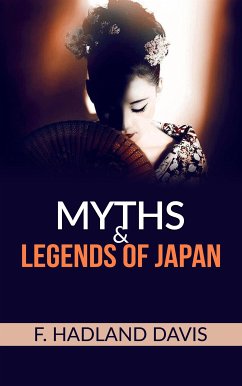This is a history of the fairy tales and folklore that originated out of Japan dating back millennia. From the intro:
“Pierre Loti in Madame Chrysanthème, Gilbert and Sullivan in The Mikado, and Sir Edwin Arnold in Seas and Lands, gave us the impression that Japan was a real fairyland in the Far East. We were delighted with the prettiness and quaintness of that country, and still more with the prettiness and quaintness of the Japanese people. We laughed at their topsy-turvy ways, regarded the Japanese woman, in her rich-coloured kimono, as altogether charming and fascinating, and had a vague notion that the principal features of Nippon were the tea-houses, cherry-blossom, and geisha. Twenty years ago we did not take Japan very seriously. We still listen to the melodious music of The Mikado, but now we no longer regard Japan as a sort of glorified willow-pattern plate. The Land of the Rising Sun has become the Land of the Risen Sun, for we have learnt that her quaintness and prettiness, her fairy-like manners and customs, were but the outer signs of a great and progressive nation. To-day we recognise Japan as a power in the East, and her victory over the Russian has made her army and navy famous throughout the world.
The Japanese have always been an imitative nation, quick to absorb and utilise the religion, art, and social life of China, and, having set their own national seal upon what they have borrowed from the Celestial Kingdom, to look elsewhere for material that should strengthen and advance their position. This imitative quality is one of Japan's most marked characteristics. She has ever been loath to impart information to others, but ready at all times to gain access to any form of knowledge likely to make for her advancement. In the fourteenth century Kenkō wrote in his Tsure-dzure-gusa:[Pg xii] "Nothing opens one's eyes so much as travel, no matter where," and the twentieth-century Japanese has put this excellent advice into practice. He has travelled far and wide, and has made good use of his varied observations. Japan's power of imitation amounts to genius. East and West have contributed to her greatness, and it is a matter of surprise to many of us that a country so long isolated and for so many years bound by feudalism should, within a comparatively short space of time, master our Western system of warfare, as well as many of our ethical and social ideas, and become a great world-power. But Japan's success has not been due entirely to clever imitation, neither has her place among the foremost nations been accomplished with such meteor-like rapidity as some would have us suppose.
Hinweis: Dieser Artikel kann nur an eine deutsche Lieferadresse ausgeliefert werden.
“Pierre Loti in Madame Chrysanthème, Gilbert and Sullivan in The Mikado, and Sir Edwin Arnold in Seas and Lands, gave us the impression that Japan was a real fairyland in the Far East. We were delighted with the prettiness and quaintness of that country, and still more with the prettiness and quaintness of the Japanese people. We laughed at their topsy-turvy ways, regarded the Japanese woman, in her rich-coloured kimono, as altogether charming and fascinating, and had a vague notion that the principal features of Nippon were the tea-houses, cherry-blossom, and geisha. Twenty years ago we did not take Japan very seriously. We still listen to the melodious music of The Mikado, but now we no longer regard Japan as a sort of glorified willow-pattern plate. The Land of the Rising Sun has become the Land of the Risen Sun, for we have learnt that her quaintness and prettiness, her fairy-like manners and customs, were but the outer signs of a great and progressive nation. To-day we recognise Japan as a power in the East, and her victory over the Russian has made her army and navy famous throughout the world.
The Japanese have always been an imitative nation, quick to absorb and utilise the religion, art, and social life of China, and, having set their own national seal upon what they have borrowed from the Celestial Kingdom, to look elsewhere for material that should strengthen and advance their position. This imitative quality is one of Japan's most marked characteristics. She has ever been loath to impart information to others, but ready at all times to gain access to any form of knowledge likely to make for her advancement. In the fourteenth century Kenkō wrote in his Tsure-dzure-gusa:[Pg xii] "Nothing opens one's eyes so much as travel, no matter where," and the twentieth-century Japanese has put this excellent advice into practice. He has travelled far and wide, and has made good use of his varied observations. Japan's power of imitation amounts to genius. East and West have contributed to her greatness, and it is a matter of surprise to many of us that a country so long isolated and for so many years bound by feudalism should, within a comparatively short space of time, master our Western system of warfare, as well as many of our ethical and social ideas, and become a great world-power. But Japan's success has not been due entirely to clever imitation, neither has her place among the foremost nations been accomplished with such meteor-like rapidity as some would have us suppose.
Hinweis: Dieser Artikel kann nur an eine deutsche Lieferadresse ausgeliefert werden.









